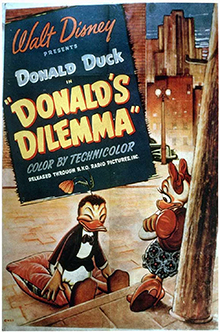Plot
Daisy recounts her story to an unseen psychologist. Her troubles began when she was walking with Donald and a flowerpot fell on his head, causing him to lose his memory but gain a melodious singing voice. He became a well-known singer and his rendition of "When You Wish Upon a Star" became a huge success. Daisy was left heartbroken at the loss of Donald and grappled with insomnia, anorexia, and suicidal thoughts. [4] [5] After an unsuccessful attempt to see Donald in concert at Radio City Music Hall, she sought the psychologist's help.
The psychologist hypothesizes that another flowerpot falling on Donald's head might restore his memory. He warns Daisy that this might also result in the loss of Donald's newfound singing talent, but Daisy is undeterred. She infiltrates one of Donald's concerts and drops a flowerpot on his head, restoring his memory and his original voice. Donald is booed off the stage but ultimately reunites with Daisy.
Reception
In The Disney Films, Leonard Maltin says that Donald's Dilemma is "perhaps the best Donald Duck of all... a sidesplitting satire of psychological dramas." Maltin provides a number of reasons why he considers this a great cartoon: "Foremost is the fact that it makes the characters and their situation real, even while reminding you that this is a cartoon. The audience actually becomes involved with Daisy's predicament, and there are marvelous little touches to heighten the emotionalism (as when she is climbing to the catwalk near the end and almost loses her step). At the same time the cartoon is filled with hilarious visual exaggeration: when Daisy recalls that Donald gave her a cold icy stare, a long icicle emits from his eyes, and as she waits for Donald at the stage door of the theatre, the seasons change and she is covered with snow. Donald's Dilemma shows how much could be done within the framework of a seven-minute cartoon, using familiar characters; it is a gem." [6]
According to John Howard Reid in Science-Fiction & Fantasy Cinema: Classic Films of Horror, Sci-Fi & the Supernatural, Daisy displays "a ruthlessly self-centered neurotic streak", but maintains the audience's sympathy throughout the film. [3]
This page is based on this
Wikipedia article Text is available under the
CC BY-SA 4.0 license; additional terms may apply.
Images, videos and audio are available under their respective licenses.
